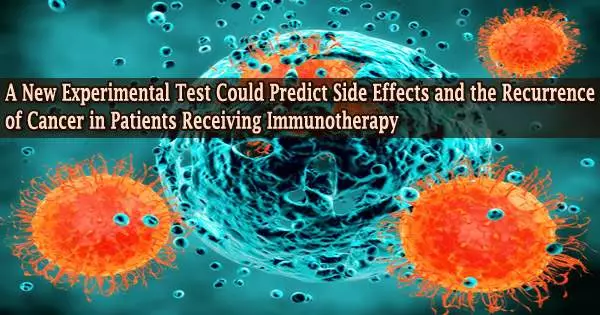According to a recent study, a single research test may be able to identify individuals who may likely experience severe side effects or a cancer recurrence after receiving immunotherapies, which use the immune system to target cancer cells.
The research, which was published online on September 15 in Clinical Cancer Research, focused on a group of immune system signaling proteins known as antibodies that detect foreign bacteria, viruses, and fungi.
In certain situations, “autoantibodies” also react to the body’s “own” proteins to create autoimmune illness. These blood proteins are made to cling to and neutralize specific bacterial and viral proteins.
The new study, led by investigators at NYU Grossman School of Medicine and its Perlmutter Cancer Center, produced data suggesting that a newly identified panel of autoantibodies, if detected in patients’ blood prior to immunotherapy, has the potential to accurately predict whether a patient’s cancer would recur and whether they would experience autoimmune side effects as a result of the treatment itself.
Patients in the research had received adjuvant immunotherapy, which aims to prevent cancer from coming back after initial treatment.
Immune cells include “checkpoint” sensors that turn them off when they receive the proper signal, protecting normal cells from autoimmune attack. Tumors are regarded as abnormal by the body, but cancer cells hijack checkpoints, such as the programmed death receptor 1 (PD-1), to prevent an immune response.
PD-1 inhibitors, a kind of immunotherapy, are utilized as adjuvant therapy in patients with resected melanoma and are effective against various malignancies. Nevertheless, some patients suffer recurrent disease or severe treatment-related side effects, researchers say.
Prior to therapy, the research team hypothesized that certain individuals may have higher levels of important autoantibodies but not enough to be recognized as having an autoimmune disease. They postulated that checkpoint inhibitors might then activate this concealed sensitivity, leading to more immune-based side effects.
Our results show that the new research test, by predicting whether a patient will respond to a treatment or experience side effects, has the potential to help physicians make more precise treatment recommendations. With further validation, this composite panel might help patients to better balance the chances of treatment success against severe side effects.
Paul Johannet
With the use of two of the most effective checkpoint inhibitors, nivolumab and ipilimumab, as well as their combination, the team in the current study was able to identify a panel of unique autoantibody signatures that could predict immune-related side effects.
More research is required, the researchers note, to validate the utility of such a test in the clinic and to better understand the relationship between autoantibodies, recurrence, and toxicity. Although their data support the predictive utility of the autoantibody scores by comparing them with data from clinical trials, they note that this is only the first step.
“Our results show that the new research test, by predicting whether a patient will respond to a treatment or experience side effects, has the potential to help physicians make more precise treatment recommendations,” says study first author Paul Johannet, MD. At the time of the study, Johannet was a postdoctoral fellow in the lab of senior study author Iman Osman, MD, the Rudolf L. Baer Professor of Dermatology in the Ronald O. Perelman Department of Dermatology and a member of Perlmutter Cancer Center. “With further validation, this composite panel might help patients to better balance the chances of treatment success against severe side effects.”
More than 950 patients who were involved in one of two Phase 3 randomized controlled trials of adjuvant checkpoint inhibitors in patients with advanced melanoma provided blood samples for the study. Before beginning any form of therapy, these patients had their tumors surgically removed and blood samples were taken.
The new test uses a microchip on which 20,000 proteins have been strategically placed. Any places where an antibody has recognized a protein in a blood sample illuminate, with the signal being stronger as the antibody concentration rises.
A score-based prediction method for each treatment was created by co-senior author Judy Zhong, PhD, and colleagues utilizing statistical modeling, the newly found panel of autoantibodies, and other data.
According to Zhong, a professor in the Department of Population Health and the Department of Environmental Medicine at NYU Grossman School of Medicine, patients with a high autoantibody recurrence score experienced a speedier return of their condition than those with a lower score.
The risk of developing severe side effects was also considerably higher in patients with higher pre-treatment autoantibody toxicity ratings than in those with lower values.
“That we identified 283 autoantibody signals shows that the biological phenomena underlying recurrence and toxicity are complex, and cannot be driven one or two biomarkers,” says Osman, also director of the Interdisciplinary Melanoma Cooperative Group at NYU Langone Health.
In the future, the researchers intend to examine the prognostic utility of autoantibody signatures in patients with the additional cancer types for which checkpoint drugs are now licensed.





